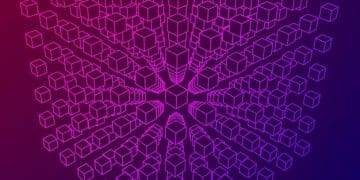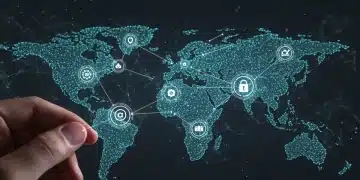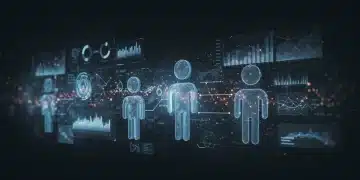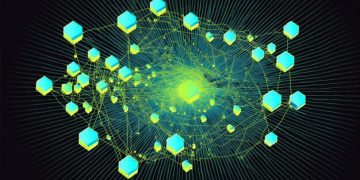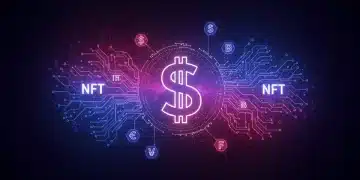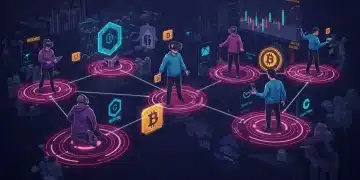Smart Contract Governance: DAOs Revolutionizing Decentralized Decisions

Smart contract governance, empowered by Decentralized Autonomous Organizations (DAOs), transforms decision-making processes into decentralized, transparent, and community-driven systems, ensuring efficient and secure execution of smart contracts.
The world of blockchain technology is constantly evolving, and one of the most exciting developments is the rise of smart contract governance: Decentralized Decision-Making with DAOs. This innovative approach is revolutionizing how decisions are made and implemented within decentralized systems, offering unprecedented levels of transparency, efficiency, and community involvement.
Understanding Smart Contract Governance
Smart contract Governance refers to the mechanisms and processes by which changes, upgrades, and decisions related to smart contracts are managed and executed. Traditionally, smart contracts were immutable once deployed, meaning they couldn’t be altered. However, this rigidity posed challenges, leading to the development of governance models that allow for necessary modifications and improvements.
The Need for Governance in Smart Contracts
Smart contracts, while powerful, are not without their limitations. Bugs, unforeseen circumstances, or the need for new features can necessitate changes. Governance mechanisms provide a structured way to address these issues, ensuring that smart contracts remain adaptable and effective over time.
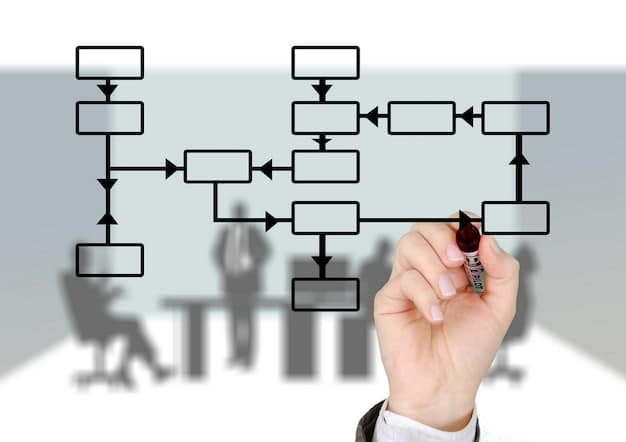
Key Components of Smart Contract Governance
Effective smart contract governance typically involves several key components, including proposal submission, voting mechanisms, and execution protocols. These components work together to ensure that decisions are made transparently and democratically.
- Proposal Submission: Anyone within the DAO can propose changes or upgrades to the smart contract.
- Voting Mechanisms: Token holders or designated stakeholders vote on the proposed changes.
- Execution Protocols: If a proposal passes, the smart contract automatically implements the approved changes.
- Transparency: All governance activities are recorded on the blockchain, ensuring transparency and auditability.
In summary, Smart Contract Governance introduces flexible and responsive systems to previously rigid smart contracts. By enabling structured and transparent decision-making, these mechanisms enhance adaptability and reliability in decentralized applications.
The Role of DAOs in Decentralized Decision-Making
Decentralized Autonomous Organizations (DAOs) are playing a pivotal role in smart contract governance. DAOs are community-led entities with rules encoded in smart contracts, enabling decentralized decision-making and management. DAOs facilitate collective decision-making, ensuring that changes to smart contracts are aligned with the interests of the community.
How DAOs Facilitate Governance
DAOs provide a framework for organizing and coordinating community input. They enable token holders to participate in decision-making processes, ensuring that smart contract governance is truly decentralized. The usage of DAOs allows for inclusive and democratic administration of the contracts, where every community member is heard.
Benefits of Using DAOs for Governance
Using DAOs for smart contract governance offers several advantages, including increased transparency, enhanced security, and greater community involvement. These benefits contribute to the overall robustness and sustainability of decentralized systems.
- Increased Transparency: All governance activities are recorded on the blockchain, ensuring full transparency.
- Enhanced Security: Decentralized decision-making reduces the risk of manipulation or single points of failure.
- Greater Community Involvement: DAOs empower token holders to actively participate in governance processes.
Overall, DAOs effectively leverage the principles of blockchain to bring power back to the community. This establishes trust and encourages widespread governance through their smart contracts and decentralized autonomous organization.
Implementing Decentralized Governance
Implementing decentralized governance for smart contracts requires careful planning and execution. It involves defining clear governance rules, establishing voting mechanisms, and ensuring that the system is secure and transparent. A concrete plan and knowledge are a necessity to create great decentralized governance.
Defining Governance Rules
The first step in implementing decentralized governance is to define clear rules that govern the decision-making process. These rules should specify how proposals are submitted, how voting is conducted, and how decisions are executed. These parameters are important to maintain smooth operations.
Establishing Voting Mechanisms
Voting mechanisms are crucial for decentralized governance. Common approaches include token-weighted voting, where each token represents a vote, and quadratic voting, which aims to prevent the concentration of power. By establishing the right system through testing, governance can be achieved properly.
Ensuring Security and Transparency
Security and transparency are paramount in decentralized governance. Smart contracts should be audited to identify and address potential vulnerabilities. All governance activities should be recorded on the blockchain to ensure transparency and auditability.

In conclusion, implementing decentralized governance necessitates well-defined rules, proper voting mechanisms, and a commitment to security and transparency. This ensures that the governance system is both effective and resilient, fostering community trust and participation.
Challenges in Smart Contract Governance
While smart contract governance offers numerous benefits, it also presents several challenges. These challenges include low voter turnout, governance attacks, and the complexity of implementing and managing decentralized systems. Solving these issues can be difficult, which is why many people don’t do it.
Low Voter Turnout
Low voter turnout can undermine the legitimacy of decentralized governance. Token holders may not participate in voting due to apathy, lack of awareness, or the perceived complexity of the governance process. To fix this, governance needs to be simplified.
Governance Attacks
Governance attacks, such as Sybil attacks and bribery, can compromise the integrity of decentralized decision-making. Attackers may attempt to manipulate the voting process to their advantage. Proper security and response mechanisms are very important in this regard.
Complexity of Implementation
Implementing and managing decentralized governance systems can be complex. It requires technical expertise, careful planning, and ongoing monitoring to ensure that the system is functioning as intended. Many people struggle in this regard as they may lack knowledge.
In the face of these hurdles—low voter turnout, governance exploits, and the intricate nature of decentralized system management—vigilance and innovation are key. Addressing these issues head-on will pave the way for more resilient and effective smart contract governance models.
Examples of Successful DAO Governance
Despite the challenges, several DAOs have successfully implemented decentralized governance models. These examples provide valuable insights and best practices for others looking to adopt similar approaches. Exploring them will allow for better practices to be adopted.
MakerDAO
MakerDAO is one of the most well-known examples of successful DAO governance. It uses a dual-token system, with MKR token holders voting on key parameters of the Maker Protocol. Their system of DAO Governance allows for transparency and easy changes to the protocol itself.
Compound
Compound is another example of a DAO that effectively uses decentralized governance. COMP token holders can propose and vote on changes to the Compound protocol, ensuring community involvement in its development and evolution. Similarly to MakerDAO, they utilize token holders to vote on the changes that are proposed.
Aragon
Aragon provides a platform for creating and managing DAOs. It offers a suite of tools and services that simplify the process of implementing decentralized governance, making it accessible to a wider range of projects. They allow for other organizations to use their system when implementing their DAO Governance.
In conclusion, these examples of MakerDAO, Compound, and Aragon demonstrate the potential of decentralized governance. By following their model, similar outcomes can be achieved in other projects.
The Future of Smart Contract Governance
The future of smart contract governance looks promising, with ongoing developments and innovations aimed at addressing current challenges and unlocking new opportunities. As blockchain technology evolves, governance models will likely become more sophisticated and user-friendly, fostering greater adoption and participation. It is important to always be improving.
Advancements in Voting Mechanisms
Researchers and developers are exploring new voting mechanisms that can improve voter turnout and prevent governance attacks. These include liquid democracy, conviction voting, and holographic consensus that enhances security and accessibility.
Integration with Layer-2 Solutions
Layer-2 scaling solutions can help address the scalability challenges associated with on-chain governance. By moving governance activities to Layer-2, DAOs can reduce transaction costs and increase the speed of decision-making. Lower costs and faster times is very important in the modern world.
Increased Adoption and Standardization
As more projects adopt decentralized governance models, there will be a greater need for standardization and best practices. This will help ensure interoperability and reduce the risk of errors or vulnerabilities. This will lead to more reliable systems that can be used properly as things become more standardized and widespread.
In summary, the future of smart contract governance is poised for significant advancements through enhanced voting mechanisms, integration with Layer-2 solutions, and increased standardization. These developments will not only tackle current challenges but also unlock new opportunities, driving broader adoption and participation in decentralized systems.
| Highlights | Brief Description |
|---|---|
| 💡Smart Contract Governance | Mechanisms for managing changes to smart contracts, ensuring adaptability and effectiveness. |
| 🗳️ Role of DAOs | DAOs facilitate community-led decision-making, enhancing transparency, security, and involvement. |
| 🛡️ Implementation Challenges | Addressing issues like low voter turnout, governance attacks, and implementation complexity. |
| 🚀 Future Trends | Advancements in voting mechanisms, integration with Layer-2, and increased standardization. |
▼
Smart contract governance refers to the methods and processes used to manage and implement changes, updates, and decisions related to smart contracts. This helps smart contracts stay adaptable and effective and introduces flexibility to rigidity.
▼
DAOs facilitate community-led decision-making, transparency, and security. They allow token holders to participate in proposals and votes, which guarantees alignment with all interests of the community.
▼
The main challenges include, low participation, risk of governance attacks such as Sybil as well as bribery, and the difficulty of managing decentralized systems. There are more, but these are the most common ones.
▼
Examples of successful DAO governance can be found in MakerDAO, Compound, and Aragon. Each effectively implements clear and transparent processes to deal with community led decision making protocols and changes.
▼
The future includes advancements in voting mechanisms such as liquid democracy, integration with Layer-2, and an increase in widespread DAO adoption. This will lead to more accessibility and better overall systems.
Conclusion
In conclusion, smart contract governance, driven by DAOs, represents a significant advancement in decentralized decision-making. By addressing the limitations of traditional smart contracts and fostering community involvement, these innovative models are paving the way for more transparent, secure, and adaptable decentralized systems. While challenges remain, ongoing developments and real-world examples demonstrate the potential of DAO Governance to revolutionize how decisions are made and implemented in the blockchain era.
